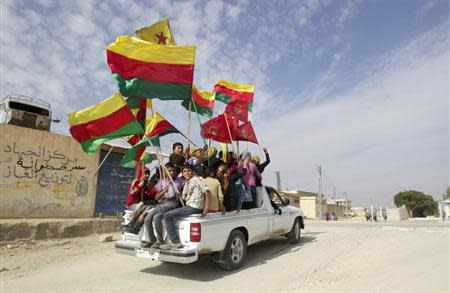Syrian Kurds make fresh military gains after declaring self-rule

By Erika Solomon BEIRUT (Reuters) - Kurdish militias seized another seven villages in northeastern Syria, activists said on Wednesday, a day after the fighters' political wing announced an interim administration that aims to carve out an autonomous Syrian Kurdish region. Kurds, often described as the world's largest stateless ethnic group, number about 30 million, concentrated in parts of Turkey, Iran, Syria and Iraq. While they have had partial autonomy in Iraqi Kurdistan since 1991, nationalist movements have long been suppressed in Turkey, Syria and Iran. In the chaos of Syria's 2-1/2 year civil war, Kurds there have captured most Kurdish-dominated cities. They have made major territorial gains in recent weeks, driving out the mostly Arab Islamist rebel units in their areas and paving the way for their long-declared plans for independent governance. Kurdish activists said the overnight gains pushed back al-Qaeda-linked rebel units in a southern chunk of Hassaka province, where the ethnic majority is Kurdish. The Kurds themselves are divided over the political group whose militias are behind the advances - the Democratic Union Party (PYD). The other main party, the Kurdish Democratic Party (KDP), did not sign the plan for self-administration and has declined to comment on the declaration. The announcement of an interim administration in Kurdish-held areas goes against the wishes of political leaders in Kurdish-run northern Iraq, who are friendly with the regional power Turkey. Ankara is wary of moves that could encourage further demands for autonomy among its own Kurdish population. Turkey is currently holding shaky peace talks with the Kurdistan Workers' Party (PKK), with which it fought a three-decade war. The PKK is now believed to be aligned with PYD's well-trained militias fighting in Syria. Iraqi Kurdish officials declined to comment openly, but privately said they saw the declaration, which lays out plans for a regional government like their own, as part of a deal with Syrian President Bashar al-Assad. Many Kurds are dismayed by the prospect that four decades of Assad family rule, under which Kurds were severely oppressed, could be replaced by one-party rule under the PYD. Turkish Foreign Minister Ahmed Davutoglu also accused the PYD of rebuilding ties with Assad while stifling its critics. "The PYD's gravest mistake was to oppress the Kurdish opposition in areas under its control, and to exert great pressure on other Kurds to an extent that both we and the regional government in northern Iraq receive many complaints from Kurds there," he said. Assad is fighting to put down a revolt against his rule, led by Syria's Sunni Muslim Arab majority. The opposition accuses Assad of exploiting Kurdish aspirations for autonomy to get their cooperation in the fight against the rebels. SELF-RULE IN SYRIA Kurdish groups aligned with the PYD on Tuesday said the planned local government would help bring stability and security to Kurdish regions amid the violence in Syria, which has killed well over 100,000 people. The declaration's signatories also drew up a "social contract" laying out a vision for local governance through a regional parliament. It called for the region to have its own flag and national anthem but remain part of Syria. "This contract aims to create a democracy whose base will be a democratic Syria with its regions of self-rule ... it adopts a new system based on local establishments and regional autonomy in a pluralistic Syria," the contract said. Regionally, the PYD's advances could signal a rift among the Kurds. Their plan goes directly against the wishes of the Kurdistan Regional Government (KRG) in northern Iraq, which has been hosting Syrian Kurdish politicians and a quarter-million Syrian refugees, mostly Kurds. The military and political advances being made by the PYD highlights the growing tensions between the KRG and the PKK over transnational leadership of the Kurds. Critics of the PYD also accuse it of getting help from outside powers - namely, the regional Shi'ite power Iran and Iraq's Shi'ite-controlled central government, which are both allies of Assad. (Additional reporting by Isabel Coles in Arbil, Additional reporting by Ece Toksabay and Nick Tattersall in Istanbul; Editing by Will Waterman)
